Arlo Guthrie - Old Town School of Folk Music, Chicago, 13/10/2013
by Lisa Torem
published: 6 / 11 / 2013
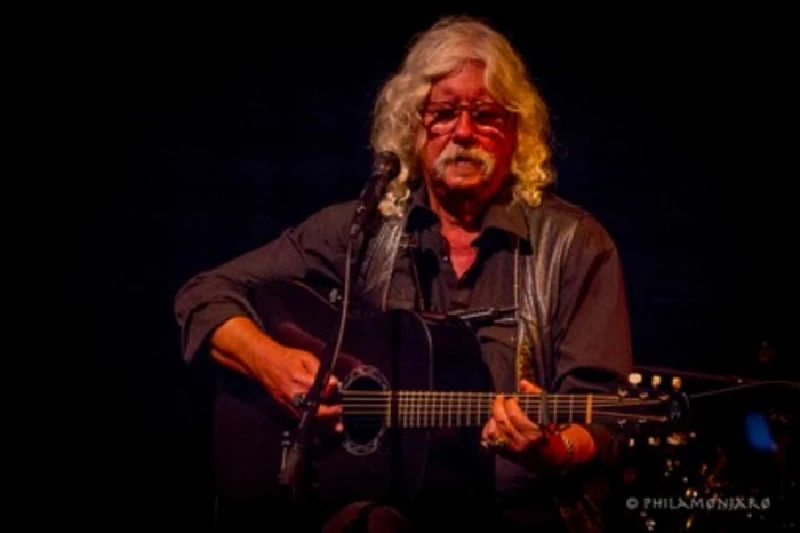
intro
Lisa Torem finds that 60's veteran and social protestor Arlo Guthrie has lost none of his political focus or sense of injustice in a daytime show at the Old Town School of Folk Music in Chicago
I want our country to be the one that helped everybody, no matter their politics, religion, or traditions. That would be a country to be proud of,” writes Arlo Guthrie on his website. The still longhaired singer, whose rendition of ‘Alice’s Restaurant Massacre’ created a marvellous stir at the Newport Music Festival in the 1960s, has a strong thread of folk wisdom and fairness running through his veins, much like his famous old man. He’s the son of songwriter Woody Guthrie and Marjorie Mazla Guthrie, a professional dancer and he is the oldest of his siblings. His kids - Woody’s grandkids – also perform. His sister Nora takes charge of the elder Guthrie’s vast library of material; Arlo oversees the project, but essentially takes to the road. That rambling thread extends to his son, Abe, who plays keyboards and does backing vocals on tour. Guitarist Bobby Sweet adds rich solo touches, and Terry A La Berry delivers much finesse on drums. The Old Town School of Folk Music fits in well with the other concert destinations, which include opera houses, theatres, the Woodstock museum and arts centres; places where intimacy is appreciated and communication takes precedence over big ticket libations. The audience is mostly older, yet Arlo is one of the rare performers who welcome kids. After all, when his father performed on radio, folk fests or locally, life was casual and performers appealed to their immediate communities, young to old, and the name of the current tour, ‘Here Come the Kids’ suggests an acceptance of family. Last year, the band celebrated the Woody Guthrie Centennial and mourned the passing of Jackie, Arlo’s wife of more than forty-years. He later described the first time he met her, when she was on horseback. She was the most beautiful woman he had ever seen. The concert, in general, allowed us the opportunity to really get to know Arlo because he brought to life the relevance of his father’s material. He brought us to the town of Okemah, Oklahoma, a place where, on the surface, nothing much happened, yet every year an outpour of Guthrie fans flood the town to commemorate his unsung father. The set started out with ‘Goodnight Sweetheart’. Arlo’s excellent harmonies and versatile chording morphed this simple song into a robust ballad. Arlo explained how he benefitted from frequent visitors like Leadbelly, Brownie McGee and Sonny Terry. Ramblin’ Jack Elliott and Pete Seeger also made a huge impression on the young artist, personally and professionally. Arlo is as real as it gets. Dressed in a faux leather vest and denim, he parked himself on a stool and sighed, “We don’t do three o’ clock really well…” When a member of the audience thanked him for coming, he grinned and replied. “Don’t thank me yet. Let’s see how it goes.” He reminded us that it was his dad’s 100th birthday and that “my family’s crazy. I’m the normal one.” Arlo talked about Woody’s dangerous engagement as a merchant seaman. His admiration shone through, especially when recounting Woody’s first time hearing one of his originals played on a jukebox. “He didn’t say much, just kept putting money in the jukebox,” Arlo quipped. ‘Oklahoma Hills’ has an engaging family history. Woody wrote it in 1937 and his cousin, Jack Guthrie, recorded it, too, as more of a Western swing version in 1945. Like many Guthrie songs, the lyrics spoke lovingly of the land: “Where the black oil rolls and flows and the snow-white cotton grows.” The song was widely popularised by too many artists to list, but included Jim Reeves, Bruce Springsteen, Chet Atkins, Ernest Tubb and Kay Starr. Like Arlo Guthrie’s ‘Massachusetts,’ it became an official state folk song (at the beginning of this decade), and it was one of the gems of Arlo’s album, ‘Running Down the Road’ (1969). ‘Pretty Boy Floyd,’ documented the life of a criminal, although Guthrie described him as more of a folk hero: “You won’t ever see an outlaw drive a family from his home.” Arlo explained that he wasn’t always enamoured with folk music. In fact, the early stuff repelled him. He cracked some jokes about high-pitched Elizabethan vocals and pretentious white folksingers at the start of the movement. Arlo was more at home with sea shanties and Western-inspired material. His version of ‘St James Infirmary’ featured Abe’s crisp arrangements, and Arlo’s voice grew coarsely animated when singing about “Joe Kennedy’s bloodshot eyes.” The song has palpable lyrics, and, although it has traditionally been widely covered, it’s not played nearly enough these days. Arlo played a near perfect acoustic guitar solo as an extended outro. He kidded about his acting career, “I had a vacation from being me,” and contrasted the tough blues number with the delicate but elaborate ‘Haleiwa Farewell’ aka ‘Haleiwa Blues’, an instrumental featuring a gorgeous descending bass line and subtle harmonic shadings. The next songs were historically based and sombre; brimming with human tragedy. After the retelling of ‘The Sinking of Reuben James’, Arlo launched into the soul-crushingly true story, ‘Deportes’, “They chase us like hoodlums and wrestlers and thieves”, marks the refrain. It spoke to nameless individuals from Mexico who suffered a cruel death thanks to government apathy. ‘1913 Massacre’ was about miners and their families trying to celebrate rare time together on Christmas Eve in Calumet, Michigan, before suffering their own tragic outcome. In response to Copperball thugs. Narrator Arlo wailed, “See what your greed for money has done.“ Whilst a good part of the afternoon was spent regaling Woody Guthrie’s most powerful political anthems, there were some other surprises. One featured Woody Guthrie lyrics, ‘I Hear You Sing Again,’ which Nora Guthrie had asked Janis Ian to complete. It was sensitively arranged and heartbreaking. Arlo spoke out more of Woody’s childhood memories, the Great Depression and the miserable windstorms and decade of drought that motivated many homesteaders to move to California, whilst his own dad stayed. “My dad stayed around to see how hard it would get,” he recalled. ‘Dustbowl’ had a light refrain, but a bittersweet message. Arlo reminded us that his family made their own instruments. In fact, there were no magic hands offering Arlo alternate guitars, blues harps or strings. He seemed proud and very happy to do his own tunings; taking his time between songs to enrich us with anecdotes and wisecracks. The stories of migrating made even more sense when he played ‘City of New Orleans,’ a homage about rail travel, which the late songwriter Steve Goodman recorded in 1972 and performed many times in this very hall. It was a hit for Arlo, as was ‘Coming into Los Angeles,’ which was accompanied by his ironic story about Jackie, being arrested and detained at the airport because of a freaky mix-up. He showed off some blues licks during ‘Alabama Bound’ (Leadbelly) and then sort of messed around with some light material that doubled as kids’ songs. Arlo grew enthusiastic talking about Pete Seeger, with whom he performed at Carnegie Hall last year and through the years. He grinned when he stated that his heroes “grew up before the era of recorded music.” At the piano he talked about his love of “rags,” and played the delightful ‘The St. Louis Tickle’. When he returned to guitar, he expressed awe over his musical heroes. “I watched them like a hawk,” he stated, referring to his mindful observations of Brownie McGee and Sonny Terry. ‘Highway in the Wind’ featured Arlo’s blues harp and his father’s version of ‘This Land is Your Land’. Whilst American children generally learn a few of the more innocent verses, it’s the longer version that really speaks Woody’s truth. Not surprisingly, Arlo was called back for an encore. He played a few measures of ‘Alice’s Restaurant’, creating a comical monologue between stanzas and ended with a song, which was as serene as a psalm, but highly original; ‘My Peace’ “is all I’ve ever had/It’s all I ever knew.” The lyrics had been written by Woody Guthrie during his last days suffering from Huntington’s chorea – he died in 1967. The two-hour concert contained deep lyrics and splendid arrangements. The band seemed very touched to honour Woody Guthrie’s memory and gave their all; solo-wise and ensemble-wise. Enthusiasm was clearly written on their faces. It was interesting to watch a son retrace his father’s still- poignant trajectory, and it was enjoyable to catch up with Arlo’s contagious affection for performance and picking. Arlo Guthrie is a truly impressive multi-instrumentalist as well as storyteller and his actions over the last years, performing on behalf of Hurricane Katrina and the Occupation movement, prove he knows he can make a difference. Despite that, even this lyric “When the songs I’m singing don’t mean nothing"…(‘In Times Like These'), strike us as startlingly effective. Of course, like so much of this family material, you have to hear each song to the end, to really get the point, the promise and the beauty. The photographs that accompany this article were taken by Philamonjaro at www.philamonjaro.com.
Band Links:-
https://www.arloguthrie.com/https://www.facebook.com/arloguthrie/
https://twitter.com/folkslinger
Picture Gallery:-
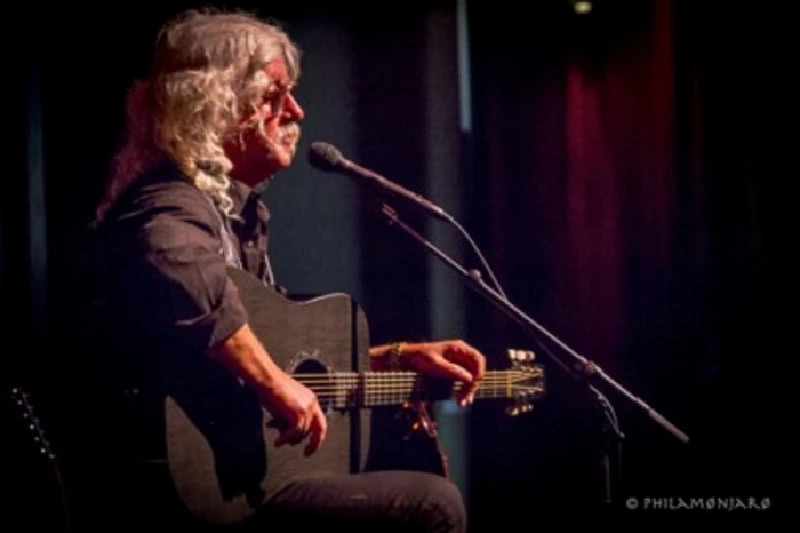
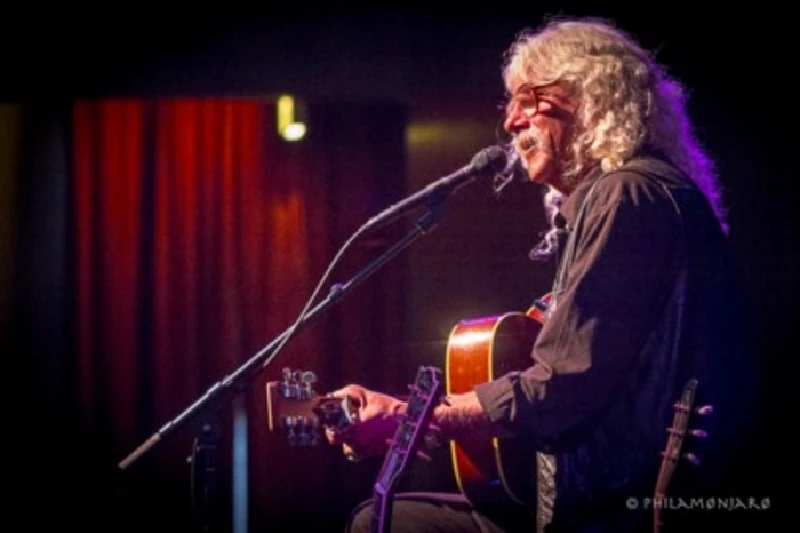
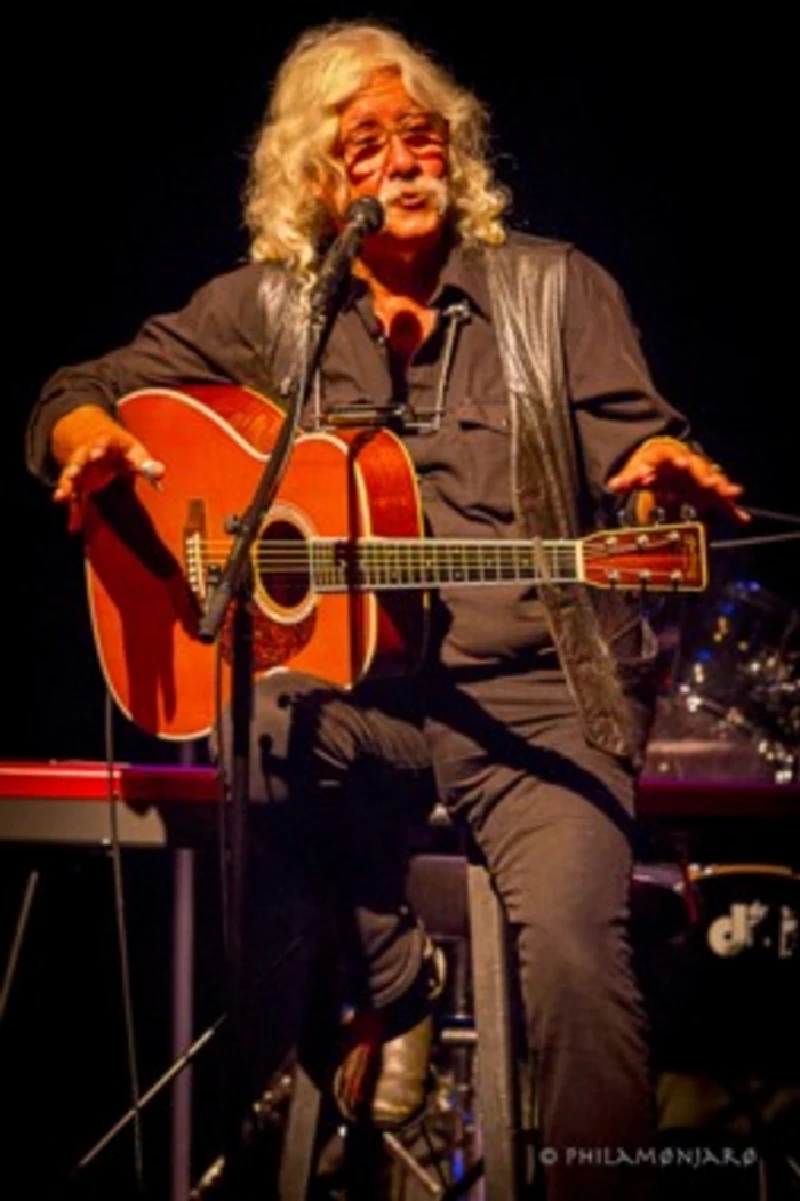
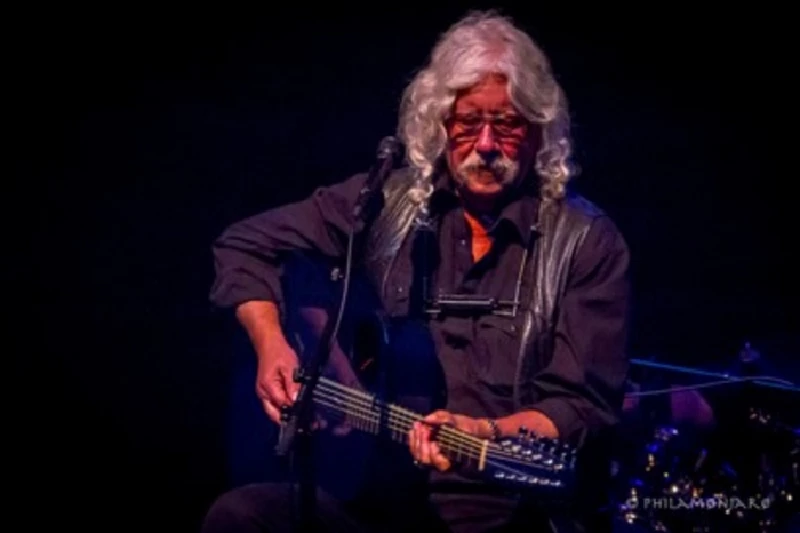
interviews |
|
Interview (2013) |
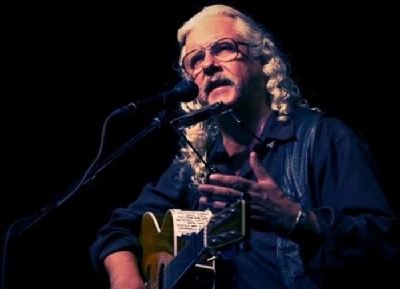
|
| Lisa Torem chats to folk and protest singer Arlo Guthrie about his lengthy career, his political work and the influence upon him of his father, Woody Guthrie |
live reviews |
|
Lobero Theatre, Santa Barbara, 19/3//2019 |
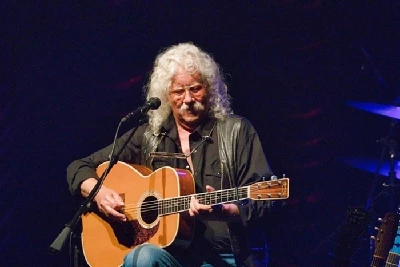
|
| L.Paul Mann watches iconic singer-songwriter Arlo Guthrie make a welcome return to the Lobero Theater in Santa Barbara. |
most viewed articles
current edition
Shrag - Huw Stephens Session 08.12.10 and Marc Riley Session 21.03.12Gary Numan - Berserker
Razorlight - Photoscapes
John Hassall - Photoscapes
Max Bianco and the BlueHearts - Troubadour, London, 29/3/2025
Primal Scream - Photoscapes
Roberta Flack - 1937 - 2025
Waeve - Club Academy, Manchester, 18/3/2025
previous editions
Heavenly - P.U.N.K. Girl EPManic Street Preachers - (Gig of a Lifetime) Millennium Stadium, Cardiff, December 1999
Boomtown Rats - Ten Songs That Made Me Love....
Beautiful South - Ten Songs That Made Me Love...
Barrie Barlow - Interview
Oasis - Oasis, Earl's Court, London, 1995
Trudie Myerscough-Harris - Interview
Dwina Gibb - Interview
Pixies - Ten Songs That Made Me Love...
Doris Brendel - Interview
most viewed reviews
Pennyblackmusic Regular Contributors
Adrian Janes
Amanda J. Window
Andrew Twambley
Anthony Dhanendran
Benjamin Howarth
Cila Warncke
Daniel Cressey
Darren Aston
Dastardly
Dave Goodwin
Denzil Watson
Dominic B. Simpson
Eoghan Lyng
Fiona Hutchings
Harry Sherriff
Helen Tipping
Jamie Rowland
John Clarkson
Julie Cruickshank
Kimberly Bright
Lisa Torem
Maarten Schiethart